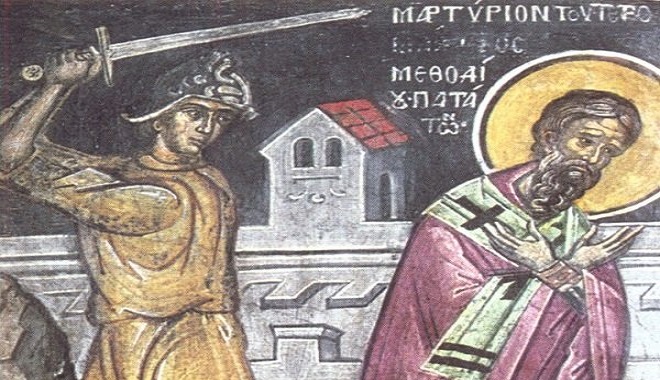Hieromartyr Methodius, Bishop of Patara (June 20)

The Hieromartyr Methodius, Bishop of Patara (Lycia in Asia Minor), was distinguished for his genuine monastic humility. Calmly and with mildness he instructed his flock, but he firmly defended the purity of Orthodoxy and he energetically contended against heresies, especially the widespread heresy of the Origenists. He left behind him a rich literary legacy: works in defense of Christianity against paganism, explications of Orthodox dogmas against the heresy of Origen, moral discourses, and explanations of Holy Scripture.
Saint Methodius was arrested by the pagans, steadfastly confessed before them his faith in Christ, and he was sentenced to death by beheading in the year 312.
Because of his wisdom and virtue, this Saint was surnamed Eubulus (“of good counsel”). He was an eminent theologian and one of the first to oppose and refute the heretical writings of Origen. According to Jerome (De vir. ill., 83) and Socrates the historian (Eccl. Hist., 6:13), he was bishop, not of Patara (as a sixth century work by Leontius the Byzantine wrongly asserts), but of Olympus in Lycia, and later, of Tyre in Phoenicia. It appears he was called Bishop of Patara by later writers because his famous dialogue concerning the resurrection takes place in that city. He underwent a glorious death as a martyr in Chalkis of Greece in the year 311, under Emperor Maximinus. Among his extant writings is one called Symposium of Virgins.
Methodius dedicated himself to asceticism from his youth, and like a city on a hill he was seen and called to the episcopacy in the city of Patara in Lycia. As a learned and eloquent hierarch, Methodius wrote against the heresy of Origen. His “God-inspired words shone throughout the entire world like lightning.” The pagans rose up against him, tortured him and beheaded him in Chalcis in Syria in the year 311 A.D.
Apolytikion of Hieromartyr Methodios
Fourth Tone
As a sharer of the ways and a successor to the throne of the Apostles, O inspired of God, thou foundest discipline to be a means of ascent to divine vision. Wherefore, having rightly divided the word of truth, thou didst also contest for the Faith even unto blood, O Hieromartyr Methodios. Intercede with Christ our God that our souls be saved.
Source: oca.org / goarch.org / westserbdio.org





